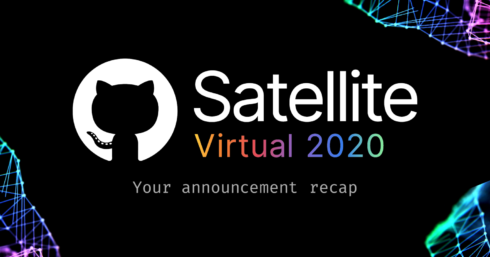
Despite being apart this year from attendees, GitHub’s virtual Satellite conference was focused on bringing software communities together. The company announced Codespaces, GitHub Discussions, code scanning and secret scanning, and GitHub Private Instances.
“GitHub is home to thousands of software communities, from open source projects to enterprises, from small teams to the largest organizations. This year’s Satellite, our first virtual conference, is about giving communities tools to come together and solve the problems that matter to them,” GitHub wrote in a post.
Codespaces is a new development environment within GitHub that aims to make contributing to projects easier. The solution is currently in a limited public beta. It includes a browser-based version of the Visual Studio Code editor, support for code completion and navigation, and support for terminal access. While the company is still working out the pricing details, it did note that its code-editing features will always be free in the Codespaces IDE.
GitHub Discussions focuses on collaborating outside the codebase. According to the company, while GitHub has only offered issues and pull requests as a place to have conversations in the past, it wants to give developers a place where they can have open discussions. A beta version for public repositories will be available soon.
“Discussions live in your project repository, so they’re accessible where your community is already working together. Their threaded format makes it easy to start, respond to, and organize unstructured conversations. Questions can be marked as answered, so over time a community’s knowledge base grows naturally. And because discussions aren’t closed the way issues are, they can easily serve as a place for maintaining FAQs and other collaborative documentation. We recognize that community discussion is as much a part of development as coding, so discussion contributions appear in users’ contribution graphs,” the company wrote.
Code scanning and secret scanning are new beta features that work to secure code. Code scanning is available as a GitHub-native experience and works to find potential security vulnerabilities. It displays results in a pull request and uses advanced semantic analysis to find real vulnerabilities. It will be available free for open source.
Secret scanning, formerly known as token scanning, is now available for private repositories. The feature has been around since 2018, but hadn’t been available for private code. It will also be free for all public repositories.
Lastly, GitHub Private Instances were designed for enterprises who needed more security, compliance and policy features. The solution is expected to be available soon.
Also, as part of the conference GitHub announced its Octoverse report, this year taking a look at developer productivity, work cadence and collaboration during the early days of COVID-19. Key findings of the report included consistency developer activity, a flux in GitHub issues, a changed work cadence, and implications for burnout. Full details are available here.






